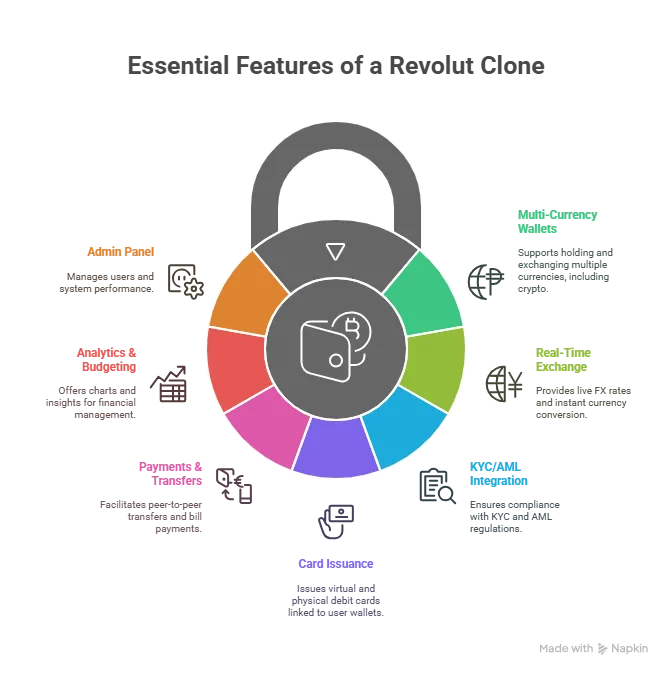Not too long ago, starting a bank meant raising millions, hiring a small army of compliance officers, and navigating red tape across multiple continents. Fast forward to 2026, and building your own digital banking app is a whole different game. Entrepreneurs today are doing what used to take years—in a few months—with powerful clone scripts and white-labeled infrastructure.
If you’re eyeing the fintech space, you’ve probably looked at Revolut with envy. Multi-currency wallets, instant transfers, flashy debit cards, and in-app trading—it’s no wonder they’ve grown into a global powerhouse. But here’s the good news: you don’t need Revolut’s budget to build a banking app with those features. You just need the right clone script.
In this guide, we’ll break down the best Revolut clone scripts available in 2026, comparing features, pricing, tech stacks, and what to watch out for. We’ll also throw in a few pointers on how Miracuves helps fintech dreamers go live faster, cheaper, and smarter.
Why Build a Revolut Clone in 2026?
Digital banking isn’t a trend anymore—it’s infrastructure. More than 2.5 billion people now prefer app-based finance tools over traditional banks. Revolut, N26, Chime, and others have set the bar for what users expect: sleek interfaces, instant access, low fees, and zero friction.
If you’re looking to disrupt your local banking market, serve unbanked communities, or offer embedded finance inside an existing app, a Revolut-style platform is your launchpad.
That’s where clone scripts come in. Instead of building from scratch, you start with a base that’s feature-rich, compliant-ready, and proven in production. It saves time, money, and stress.
Read More : Revolut App Features List: What Makes It a Fintech Powerhouse?
Must-Have Features in a Revolut Clone Script

Before we dive into the best options, let’s align on what a solid Revolut clone script must include:
1. Multi-Currency Wallets
Support for holding, exchanging, and transferring multiple fiat currencies. Some scripts also include crypto wallets or stablecoin integrations.
2. Real-Time Currency Exchange
Live FX rates, instant conversion, and minimal fees. Ideally with a backend that supports rate margin controls for monetization.
3. KYC/AML Integration
Compliance isn’t optional. Built-in support for KYC verification and anti-money laundering (AML) workflows is critical.
4. Card Issuance
Virtual and physical debit cards linked to user wallets. Integration with card providers like Mastercard, Visa, or fintech APIs like Marqeta and Galileo.
5. Payments & Transfers
Peer-to-peer transfers, bill payments, IBAN/account generation, and QR-based payments.
6. Analytics & Budgeting Tools
Modern users expect charts, notifications, spend categorization, and personalized insights.
7. Admin Panel & User Management
Manage users, review compliance flags, set limits, and analyze system performance.
Read More : Pre-launch vs Post-launch Marketing for Revolut Clone Startups
Top Revolut Clone Scripts Compared
Here’s a breakdown of some of the most promising clone scripts in 2026, based on developer community feedback, client outcomes, and extensibility.
1. Miracuves Revolut Clone
Overview:
Miracuves offers a high-performance, white-label Revolut clone that’s tailored for international or regional banks, startups, and embedded finance models.
Features:
- Multi-currency wallet with FX control
- Built-in KYC/AML workflows
- Card API integration (supports Marqeta, Modulr, etc.)
- Admin panel with full control
- React Native frontend + Node.js backend
- Highly modular for rapid customization
Time to Launch: 3–9 days with custom branding
Support: Includes 3 months of post-launch assistance
Best For: Startups who want enterprise-grade capability with a manageable budget.
Learn more on our Revolut Clone Development page.
2. FinBox Pro (3rd-party marketplace)
Overview:
FinBox Pro is a marketplace solution focused on basic banking features. It’s a good option if you’re targeting a niche or a limited geographical region.
Features:
- Supports 5 currencies
- Built-in remittance module
- Stripe-based card issuing only
- Angular frontend, Laravel backend
Time to Launch: ~60 days
Limitations: Lacks scalable architecture for high transaction volumes
Best For: MVPs and proof-of-concept builds in smaller markets.
3. CodeBank FX
Overview:
A developer-friendly script with deep API access and documentation. Geared towards teams that plan to build on top extensively.
Features:
- FX marketplace plug-in
- No-code builder for front-end elements
- Modular KYC integration (Sumsub, Veriff)
- Go backend, Flutter frontend
Time to Launch: 60–90 days
Best For: Developer-heavy teams with specific banking integrations in mind.
Cost Factors & Pricing Breakdown
Revolut-Style Neobank & Digital Banking Platform — Market Price
| Development Level | Inclusions | Estimated Market Price (USD) |
|---|---|---|
| 1. Basic Neobank MVP | KYC onboarding, multi-currency wallet, P2P transfers, basic FX conversion, card tokenization, notifications, simple admin panel | $60,000 |
| 2. Full-Feature Digital Banking Suite | Advanced KYC/AML, savings vaults, budgeting tools, bill payments, virtual & physical cards, fee engine, referral rewards, dispute management, multi-role admin & compliance panels | $150,000 |
| 3. Global-Scale Fintech & Banking Ecosystem | Multi-region compliance, modular microservices, partner/IBAN integrations, interchange & revenue analytics, white-label partner dashboards, high-availability cloud infra, advanced risk & fraud modules | $300,000+ |
These prices reflect the global development cost of building a Revolut-style neobank platform — involving regulated onboarding flows, secure payment processing, multi-currency wallets, card issuing, and scalable, audited financial infrastructure.
Miracuves Pricing for a Revolut-Style Neobank
Miracuves Price: Starts at $18,999
Miracuves provides a ready-to-launch Revolut-style neobank solution featuring multi-currency wallets, KYC onboarding, virtual/physical card management, P2P transfers, FX conversion, analytics, and role-based admin controls — all built on a secure, high-performance JavaScript architecture.
Note
This package includes full non-encrypted source code, backend/API setup, admin panel configuration, deployment support, and Android/iOS builds — giving you a complete digital banking ecosystem ready to go live.
Start your Revolut-style neobank today with Miracuves and launch in days instead of months.
Delivery Timeline for a Revolut-Like Platform with Miracuves
Estimated deployment timeline: 3–9 days, depending on:
- KYC, onboarding flows, and user verification steps
- Wallet structure, FX rules, and limit management
- Card issuing features, virtual card flows, and security rules
- Subscription plans, fee/commission logic, and rewards
- Branding, UI personalization, and mobile app builds
Tech Stack
Built using JavaScript (Node.js, React/React Native), with MySQL/NoSQL DB, real-time event handling, and cloud-native services — enabling secure transactions, scalable wallet operations, instant notifications, and optimized neobank performance.
What to Watch Out For
Not all Revolut clone scripts are created equal. Here are a few traps you’ll want to avoid:
1. Poor Compliance Handling
If your clone doesn’t have ready-made compliance modules, you’ll spend months patching it later. KYC, AML, GDPR—these are non-negotiable.
2. Rigid Architecture
Avoid scripts with hardcoded currencies or fixed payment gateways. You’ll outgrow them faster than you think.
3. Lack of Scalability
Some cheap scripts can’t handle high transaction loads or concurrency. Make sure your provider uses proven backend frameworks and scalable DBs.
Read More : Revolut App Marketing Strategy: How to Turn Banking into a Brand
How to Choose the Right Script
Ask yourself:
- Am I building for global users or local?
- Do I need crypto support alongside fiat?
- What’s my compliance plan?
- Will I monetize via FX margin, fees, or subscriptions?
- Do I have a dev team, or need full support?
If your answer leans toward fast execution, customization, and post-launch support—Miracuves is built for you.
Final Thoughts
In 2026, launching a Revolut-styledigital bank doesn’t require a bank charter or a million-dollar investment. With clone scripts evolving rapidly, the real question is: do you want to build it the hard way—or the smart way?
Choose the right partner, the right stack, and the right roadmap—and your digital banking platform can go live in weeks, not years.
At Miracuves, we help innovators launch high-performance app clones that are fast, scalable, and monetization-ready. Ready to turn your idea into reality? Let’s build together.
FAQs
Still have questions about Revolut clone scripts? Let’s clear them up.
What is a Revolut clone script?
A Revolut clone script is a pre-built software solution that mimics the features of the Revolut app, allowing startups to launch a digital banking platform quickly.
Are clone scripts legal?
Yes, as long as you’re not copying brand assets or trademarks. Clone scripts offer similar functionality but under your own branding and tech infrastructure.
How much does it cost to build a Revolut clone?
Depending on the script and customizations, costs range from $3,000 to $20,000. Miracuves offers scalable options starting at $18999.
Can I add my own features?
Absolutely. Good clone scripts are modular, so you can add crypto wallets, rewards, or custom analytics as needed.
Is KYC included in these clones?
Yes, most high-quality scripts come with integrated or pluggable KYC and AML compliance modules.
What payment providers can I use?
Most Revolut clone scripts support integration with providers like Stripe, PayPal, and third-party APIs like Marqeta or Modulr.
Related Articles








